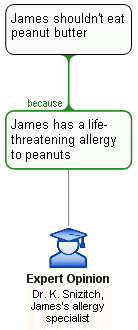The Science Of Scientific Writing Set 6 Set 6-Assessing • Second page • Third page • Fourth page • Example • Exercise 1 • Exercise 2 • Exercise 3 • Exercise 4 • Exercise 5 • Exercise 6 • Final Page Set 6.
OVERVIEW: The way to well-written science
PART I: Paragraphs and Sentences...
SET 1: The Parts of Arguments
SET 2: Indicator Words
SET 3: Refining Claims
SET 4: Locating Arguments in Prose
SET 5: Rationale's Essay Planner
SET 6: Assessing
SET 7 : More on Assessing
Exercise 2
Now we'll go one step further and evaluate both a reason and its basis box.
1. Drag this map onto your workspace and evaluate the basis box first, and then the reason (leave the position as it is for now).
Drag this image onto the workspace to proceed. You must be using the inbuilt browser in Rationale 1.3 or later.
Hints
- First evaluate the basis box: Is this a reliable source of information? Ask yourself: 'for the purposes of everyday life, if I were James would I take this as true?' (it is too skeptical to ask: 'is there any chance at all that the doctor is wrong?')
- Click on the basis box and go to the evaluate section of the ribbon and pick the icon that matches your assessment
- Then evaluate
the reason: what confidence do you have in it, given your assessment of its
basis?
- If you think the basis is reliable, ask yourself: does this reason give support for the position? How good a reason is it - strong or weak?
- If you think the basis is a poor source of information ask yourself: could I still reasonably accept the reason on other grounds? If the answer is no, then the reason can't provide any support for the position.
- Make sure you've put evaluation icons in all boxes
2. Check your work against the model.
Content of this page drawn in whole or part from the Austhink Rationale Exercises with permission from Austhink.
